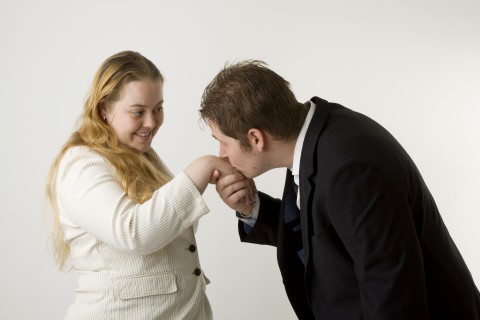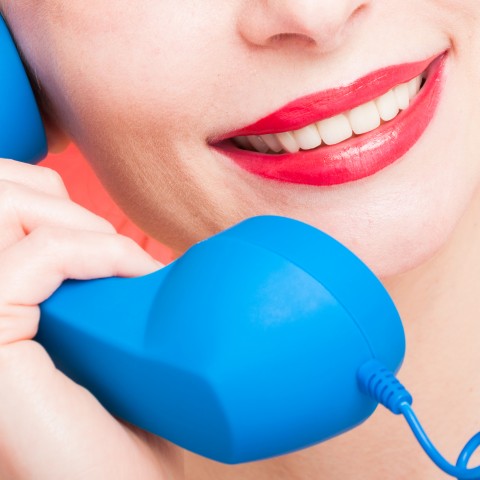People say that politeness is key to having a good experience in Romania.
And what does that start with? Saying hello in Romanian.
When you’re sitting at home or hanging out with your friends, you probably don’t say “hello” to others very often. Unsurprisingly though, when you travel, you say it a lot more. Maybe twenty, thirty times a day.
For a Romanian learner, that’s perfect. That’s thirty different opportunities to practice!
In this article, you’ll learn how to handle greetings in Romanian in all situations, and you’ll also be able to continue those greetings into the beginning of small talk. The best part is that it’s all pretty easy to understand! Let’s learn how to say hello in Romanian.
Table of Contents
- A Foundation for Your Greetings
- Throughout the Day
- The Formal and Informal Greetings
- Saying Hello Through a Phone or Keyboard
- Nice to Meet You
- How are You?
- Body Language
- Goodbye!
- Conclusion
1. A Foundation for Your Greetings
There are two words you need to know in Romanian when it comes to greeting others. Without these, you’re lost, and with them, you’re ready for pretty much anything.
The first is bună, which literally means “good.” It’s the all-purpose short greeting in Romania, good for the telephone or waving to a friend.
The second is salut, which is taken directly from French. It’s used just about as frequently in Romania as well, and it’s simply how to say “hi” in Romanian.
Like I said, with these two words, you’re set. But you didn’t come to this article to read two words. Let’s dive a little deeper.
2. Throughout the Day
Romanian, just like pretty much every other European language, has different greetings based on the different times of day.
In Romanian, “Good morning” is bună dimineața. It follows the same structure as it does in English, so if you know bună already (check the previous section), then you can guess what dimineața means as well.
“Good afternoon” is bună ziua. Ziua actually means “day,” so this could be translated as “good day” if you wish. However, that lends it a pretty old-fashioned feeling that you probably don’t want to associate with it. After all, it’s a simple “hello” we’re dealing with here.
“Good evening” is bună seara. If you’ve studied Italian or French, you can really see the Romance language connection here to words like sera or soir. Of course, that can be a handicap later on if you end up not remembering how to say it in Romanian!
Lastly, “Good night” is noapte bună. Just like in English, Romanians say this before heading to sleep. It continues to fit the pattern of direct translations, but here the words are reversed thanks to obscure etymological reasons. Noapte looks like “nap,” but it really only means “night,” nothing to do lexically with “sleep.”
You may be wondering when these actually change. After all, it’s not quite as clear as the English “afternoon.” However, that’s exactly what it is—at twelve o’clock it becomes ziua, and then at six o’clock it becomes seara. Interestingly enough, it used to be based on the time that church bells rang.
3. The Formal and Informal Greetings
There’s still one old-style and classical Romanian greeting, and that’s sărut mâna. It literally means “I kiss your hand.” The t doesn’t always get fully pronounced in the middle of the word.
Wouldn’t you know it, sometimes you’ll see older Romanian men kiss the hands of older women. However, this tradition has pretty much entirely disappeared with younger generations. The salutation still remains, as a familiar way of addressing someone much older. You might hear a grandchild say this to their grandfather, for instance.
Romanian does have a special polite verb conjugation, dumneavoastră, which is similar to the polite verb form in French or German. You use it with strangers who are past teenagerhood, and it’s said that you truly feel like an adult the first time a stranger uses it with you!
In terms of greetings, there’s no particularly formal Romanian greeting for everyday life. In order to be polite with strangers, if you were working at a bank, for instance, then you could add the equivalents of “sir” or “ma’am” after the greeting:
- Bună ziua, Domnule.
“Good day, sir.” - Bună ziua, Doamnă.
“Good day, madam.”
In different parts of Romania, or among different people, you’re likely to hear words outside the standard set. For instance, in the Transylvanian region, or among ethnic Hungarians, you’re quite likely to hear people say Servus! as a greeting. This will be familiar to anyone who has been to Austria or studied German, since it’s the same over there too!
People also like to say Ciao or ‘Neața as ordinary everyday greetings. Ciao has been in vogue for decades thanks to Italy’s cultural prestige, and ‘Neața is a simple shortening of bună dimineața. It’s also found in the name of a popular morning TV show: Neatza cu Răzvan și Dani.
Depending on the work environment you’re in, it may be expected that you greet your boss with the phrase Să trăiți!, which literally means “Long live!” In English, that sounds pretty strange, but in Romanian it’s just another set phrase with no real meaning. Actually, this greeting is used only between men. It’s an old-fashioned greeting, so you can hear this only between elderly people.
Speaking of set phrases, in the countryside there are also a handful of greetings that you don’t hear much elsewhere. Încotro means “Where are you going?” and Drum bun! means “Safe trip!” As a foreigner, you won’t be expected to know these. However, if you spend time in the countryside and want to make a fantastic impression, by all means try these out.
Last but not least, what do you think you’ll hear if you watch a Romanian vlogger? Hei! That’s been so common on Internet videos around the world that it no longer even counts as an English word.
4. Saying Hello Through a Phone or Keyboard
So up to this point, we’ve covered a lot of ground talking about how to address Romanians in person. How about if you can’t see them?
To answer a phone call, Romanians simply say bună or alo in a questioning tone of voice. Then, once they know who’s calling, they might say salut or bună again to actually begin the conversation. If the line drops out, they’ll likely say alo? alo? until they can hear again.
When you write an email, you should take note of the level of formality being used. The levels of politeness are slightly more formal as a whole in email, so you end up with formal salutations like these:
- Stimate Domnule,
“Dear Sir,” - Stimată Doamnă,
“Dear Madam,” - Stimate Domnule/Doamnă,
“Dear Sir / Madam,” (Supposing you don’t know the recipient.)
More informally, you can try these greetings as well:
- Dragă Mihai,
“Dear Mihai,” - Bună Andrei!
“Hey Andrei!” - Salut Daniel!
“Hi Daniel!”
Well, at this point we’ve just about exhausted the ways to say hello in Romanian. What comes next?
5. Nice to Meet You
Okay, so how about how to say “Hello, nice to meet you,” in Romanian?
When you’re just introducing yourself, there are a couple of different ways you can express “Nice to meet you” with set phrases. Seamlessly transitioning into the next phrase will impress your Romanian acquaintances even more than a correct hello.
All of these have the same general connotations, so you should think of the English translations as interchangeable. They use different words here just to set them apart in your own memory.
- Mă bucur să te cunosc.
“Glad to meet you.” - Îmi face plăcere să te cunosc.
“It’s a pleasure to meet you.” - Este foarte frumos să te cunosc.
“It’s very nice to meet you.”
We’ll briefly touch on body language later on, but for now you should just know that Romanians will expect to shake hands at this point of an introduction, just like in the USA.
6. How are You?
Now let’s learn how to say “Hello, how are you?” in Romanian.
Small talk in Romanian deserves an article all on its own. Here, though, the phrase “how are you” barely even counts as small talk. It’s more an extension of the greeting itself, and in fact, among close friends that’s what’s often used as a greeting instead.
The standard version is Ce mai faci? which literally means “What are you doing?” However, it’s not actually used in that sense, and instead it’s basically the standard way to say “What’s up?”
We can shorten it even further, going so far as to say ce faci? by itself. Funnily enough, Romanians tend to disagree about what exactly is being expressed here, even though many people use it to mean “What’s up?” as well. Some people will interpret it as “What are you doing right now?”
In order to avoid any confusion, we recommend only saying ce faci if you’ve heard somebody say it to you before.
Now we’ve got two more questions that you can use to spice up your exchange.
- Cum a fost ziua de azi?
“How was your day today?” - Cum stă treaba?
“How’s work?”
Again, these aren’t actually legitimate questions! You can answer with a simple bine, bine, meaning “Fine, fine,” and not have to give any details, even if you’ve actually had a terrible day at work.
Now let’s pivot a little bit and see how you should be carrying yourself during exchanges like the ones above.
7. Body Language
Have you ever thought about how body language can be the key to any successful communication?
Just imagine it. Someone goes into your store and says hello, but they look very stressed and won’t make eye contact. Or, someone goes door-to-door selling something, but practically invites themselves into your house.
These are real situations, not too hard to picture, and yet they feel quite off simply because the body language isn’t what we’re used to.
First off, when greeting and shaking hands as we’ve discussed before, Romanians tend to be much closer than North Americans. They move in tight to shake hands and then don’t move away during the conversation.
They also don’t tend to make as much eye contact when speaking. It’s totally fine to let your gaze wander as you talk. Also, once you’ve been introduced to someone, it’s all right to make a little bit more physical contact as well. That might include giving high-fives in the middle of the conversation or putting your hand on someone’s arm to make your point.
Lastly, it’s all right for you to be open with your emotions. Romania is a “Latin country,” and that means people can be quite forceful in conversations that they care about. So don’t feel offended if Romanians seem a little bit touchy or animated while speaking. It’s just part of their culture!
8. Goodbye!
There’s no reason to stop at “hello.” Let’s now add a couple more phrases to your repertoire that come after the conversation. That is, how to say goodbye.
The shortest and easiest way is to simply say Pa!, just like “Bye” in English. However, some people feel that this is too informal, bordering on rude, to use with strangers. Just like with ce faci, only use this if you’ve heard someone use this with you before.
The “classic” farewell phrase is La revedere, or more literally, “Until we meet again.” Use this phrase at any time and with anybody.
If you’re just going to head out and be right back, you can also say Pe mai târziu or Vorbim mai târziu. These two mean just about the same thing, so you can use either one and not worry.
9. Conclusion
So, you’ve learned how to say hello and goodbye in Romanian, and even how to inquire about someone’s well-being. At this point, you’re probably quite confident in your ability to start conversations in Romanian. And you should be!
Even if it seems like just a tiny part of a conversation, it’s still very important. It makes a big impression on people when they hear you speak their native language. If you happen to meet Romanians abroad and hit them with a bună dimineaţa, you’ll probably make their day.
But at the same time, it really is just the beginning.
The best way to continue your Romanian studies is to attack it on every front. That means listening to and reading real Romanian, while at the same time continuing to study lessons and vocabulary from RomanianPod101.com. In fact, you should probably read this article again in a few days to make the new words stick!
As you know, you’ve got the whole rest of the language to learn. Once you’ve broken the ice with hello, it makes it that much easier to continue.
How did you like this lesson? Did you learn anything new today? Let us know in the comments section!
















